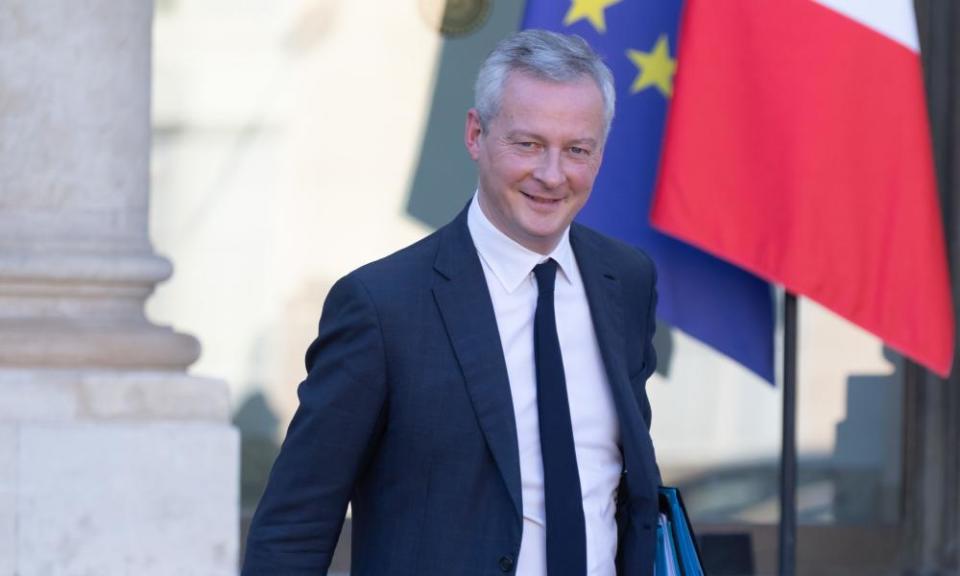'Soft' Brexit agreement not a done deal, warn EU leaders

Photograph: Darko Vojinovic/AP
France’s finance minister, Bruno Le Maire, has welcomed the draft Brexit withdrawal agreement but warned Paris would be vigilant on its final terms, amid mounting concern from EU member states that the UK was being given too soft a deal.
An agreement was “good news for the French economy, good news for all French firms,” Le Maire told French public television on Thursday. “It’s in everyone’s interest that Brexit should go ahead smoothly.”
However, he stressed France would be “cautious” over formally signing off the divorce deal to ensure it “guards French and European interests”.
If the UK stayed in a customs union, as envisaged until an agreement on future trade was negotiated, “we must be sure it respects all EU rules”, he said, including on taxation and environmental standards. The deal “must not weaken our common market”.
Any toughening of the terms of the draft agreement by the EU would be bad news for Theresa May, who faced a wave of resignations on Thursday by Brexit-backing ministers on the grounds the deal conceded too much ground to Brussels.
Germany’s chancellor, Angela Merkel, said she was “very happy that, after lengthy and not always easy negotiations, a proposal could be reached”.

The Dutch foreign affairs minister, Stef Blok, said the Netherlands would study the draft text “very carefully”, paying “extra attention to agreements on a level playing field and fishing … The customs union as backstop plan demands close examination”.
France, Spain and Denmark voiced their concerns at a meeting with the European commission on Wednesday, saying the UK was being given a customs union without sufficient guarantees against future undercutting of EU firms and EU standards. The Netherlands has raised similar worries.
EU ministers meeting on Monday are likely to demand that the price the UK pays for a customs union, included in the withdrawal agreement as the only mutually acceptable mechanism for avoiding a hard border across the island of Ireland or down the Irish sea, must be higher.
Tariff and quota-free access to the EU through a customs union amounted to “the beginnings of a toehold in the single market”, one EU diplomat said. “We have to be absolutely sure that the UK cannot exploit that opening after Brexit in a way that would be detrimental to the single market.”
The draft agreement already requires the UK to accept that it cannot exit the customs union backstop “unless and until” the EU agrees there is no prospect of a return to a hard border, as well as meeting the EU’s level playing field conditions.
These would mean the UK being forced to abide by all EU rules published after Brexit on, for example, state aid, competition, the environment, tax and labour conditions, in some cases copy and pasting them into UK law – so-called dynamic alignment.
But diplomats say several countries – including Germany, France, the Netherlands, Belgium, Denmark, Spain and Italy – are now pressing for the EU’s negotiators to demand even tougher guarantees from the UK, including dynamic alignment on all issues covered by the level playing field.
Some countries with sizeable fishing industries are expected to resist any customs union agreement which does not grant reciprocal rights to EU vessels in return for tariff and quota-free UK imports into Europe. The draft withdrawal agreement leaves this decision until later.
Demands for tighter guarantees reflect a fundamental lack of trust in Britain’s post-Brexit intentions, which many member states suspect are driven mainly by a desire to establish a Singapore-style low-wage, low-tax, low-regulation economy on Europe’s borders.
They also illustrate how difficult it will be for Theresa May – assuming she and the withdrawal agreement survive – to negotiate a comprehensive future free-trade deal with the bloc, which sees continued membership of the customs union as the basis for those talks.
It has already rejected May’s vision of a future agreement based on her Chequers plan, which would involve the UK abiding by the EU’s rule book for goods and a “facilitated customs agreement” as impracticable cherry picking.

 Yahoo News
Yahoo News 